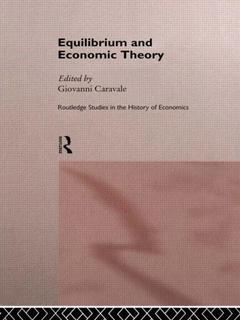Equilibrium and Economic Theory Routledge Studies in the History of Economics Series
Auteur : Caravale Giovanni Alfredo

This book considers the treatment of equilibrium by several of the most important schools of thought in economics, including:
* neoclassical economics,
* the neo-Ricardian economics,
* Post-Keynesian economics - both those who follow Joan Robinson in denying any interpretative role to equilibrium in economic theorizing and those who use the notion of equilibrium, but re-defined from a Classical or Keynesian perspective.
Date de parution : 02-2014
15.6x23.4 cm
Disponible chez l'éditeur (délai d'approvisionnement : 14 jours).
Prix indicatif 61,25 €
Ajouter au panierDate de parution : 09-1997
15.6x23.4 cm
Thème d’Equilibrium and Economic Theory :
Mots-clés :
general; giovanni; caravale; relative; prices; profit; rate; pierangelo; garegnani; capital; Vice Versa; Intertemporal Equilibrium; Short Period Equilibria; Walras’s Model; Walras’s Theory; Initial Capital Stock; General Economic Equilibrium; Supply Price; Walrasian Equilibrium; Natural Prices; Intertemporal Context; Intertemporal Analysis; Keynesian Equilibrium; Uniform Rate; Intertemporal Equilibrium Model; Market Effectual Demand; Stochastic Rationing; Deterministic Rationing; Actual Transaction; Dual Decision Hypothesis; Equilibrium Unemployment Rate; Natural Price; Involuntary Unemployment; Stationary Stochastic Process; Minimum Profit Rate



